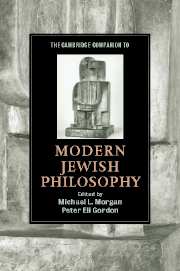Book contents
- Frontmatter
- 1 Introduction: Modern Jewish Philosophy, Modern Philosophy, and Modern Judaism
- 2 Baruch Spinoza and the Naturalization of Judaism
- 3 The Liberalism of Moses Mendelssohn
- 4 Jewish Philosophy after Kant The Legacy of Salomon Maimon
- 5 Hermann Cohen: Judaism and Critical Idealism
- 6 Self, Other, Text, God: The Dialogical Thought of Martin Buber
- 7 Franz Rosenzweig and the Philosophy of Jewish Existence
- 8 Leo Strauss and Modern Jewish Thought
- 9 Messianism and Modern Jewish Philosophy
- 10 Ethics, Authority, and Autonomy
- 11 Joseph Soloveitchik and Halakhic Man
- 12 Emmanuel Levinas: Judaism and the Primacy of the Ethical
- 13 Emil Fackenheim, the Holocaust, and Philosophy
- 14 Evil, Suffering, and the Holocaust
- 15 Revelation, Language, and Commentary: From Buber to Derrida
- 16 Feminism and Modern Jewish Philosophy
- Bibliography
- Index
14 - Evil, Suffering, and the Holocaust
Published online by Cambridge University Press: 28 September 2007
- Frontmatter
- 1 Introduction: Modern Jewish Philosophy, Modern Philosophy, and Modern Judaism
- 2 Baruch Spinoza and the Naturalization of Judaism
- 3 The Liberalism of Moses Mendelssohn
- 4 Jewish Philosophy after Kant The Legacy of Salomon Maimon
- 5 Hermann Cohen: Judaism and Critical Idealism
- 6 Self, Other, Text, God: The Dialogical Thought of Martin Buber
- 7 Franz Rosenzweig and the Philosophy of Jewish Existence
- 8 Leo Strauss and Modern Jewish Thought
- 9 Messianism and Modern Jewish Philosophy
- 10 Ethics, Authority, and Autonomy
- 11 Joseph Soloveitchik and Halakhic Man
- 12 Emmanuel Levinas: Judaism and the Primacy of the Ethical
- 13 Emil Fackenheim, the Holocaust, and Philosophy
- 14 Evil, Suffering, and the Holocaust
- 15 Revelation, Language, and Commentary: From Buber to Derrida
- 16 Feminism and Modern Jewish Philosophy
- Bibliography
- Index
Summary
As far as human eyes can judge, the degree of evil might have been less without any impediment to good.
Samuel JohnsonThe need to account for the appearance of evil in a world assumed to be ruled by goodness and justice provoked Jewish religious and philosophical reflection long before the Holocaust. The 'problem' of evil, pointed most sharply in the phenomenon of human suffering and loss, figured in the very origins of Jewish philosophy (as in Saadya’s commentary on Job [c. 935 c.e.]), and Genesis itself provided an earlier view of the knowledge of good and evil in its synthesis of cosmology and genealogy - the entry into human nature of moral conscience, which ensured that man would then make his own way across the grain of historical contingency and face divine judgment for his actions. That second nature would then impel the Biblical narrative and subsequent Jewish ethical reflection.
Motivation for philosophical and religious reflections on evil is ample in Jewish thought. On the one hand, the world was found 'good' at each stage of the Biblical creation, and except for scattered moments of mystical enthusiasm, subsequent Jewish commentary never disputed that judgment. On the other hand, a profusion of evidence attests to individual and group suffering in people who appear to deserve that condition no more (often much less) than contemporaries who fare better - often, much better. At least from the time of Rabbinic Judaism, in any event, the issue thus stated would recur in Jewish theological and philosophical discussion: how to reconcile misfortune, suffering or persecution – and exile – with the goodness of creation and the authority of an all-powerful and beneficent creator.
- Type
- Chapter
- Information
- The Cambridge Companion to Modern Jewish Philosophy , pp. 277 - 299Publisher: Cambridge University PressPrint publication year: 2007
- 1
- Cited by

